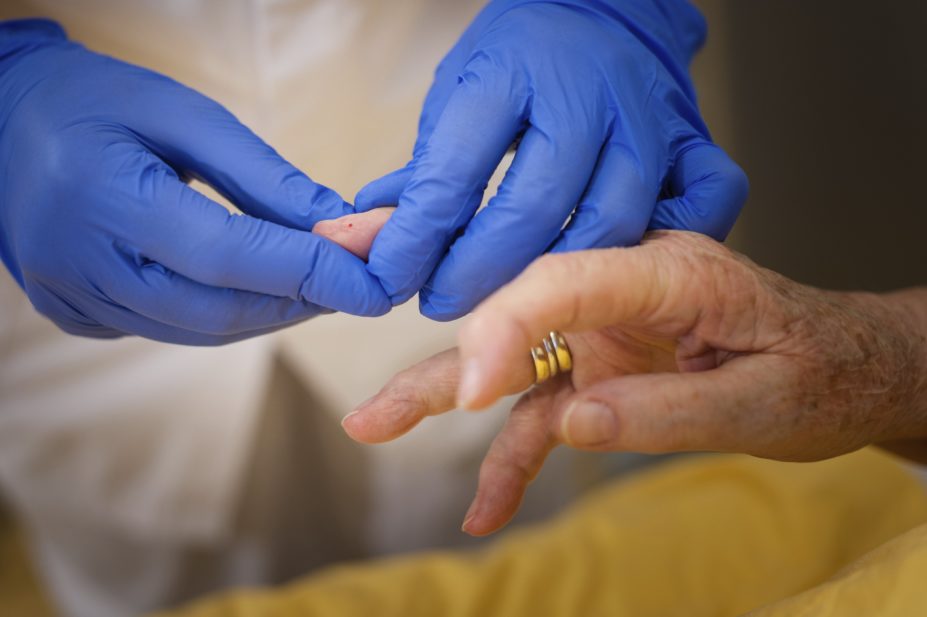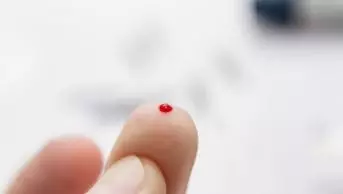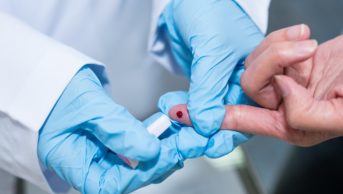
Science Photo Library
Government messaging on antibody tests was shaky from the start. From the initial days of the national lockdown, when government ministers and advisors were unable to get their message straight on when the tests would be available, to ongoing battles between pharmacies, their regulator and public health officials over the provision of rapid point-of-care tests: testing for COVID-19 antibodies has been riddled with miscommunication and a lack of clarity
This is not helped by the prevailing uncertainty over what it means to have COVID-19 antibodies, and if the tests can be trusted in the first place. So, where does antibody testing stand? Will community pharmacy ever have a role in testing? Here is what we know so far.
How does COVID-19 antibody testing work?
Of the five main types of antibody that would be produced after infection with a virus, the Medicines and Healthcare products Regulatory Agency (MHRA) is looking for just three of them in an effective antibody test — immunoglobulins A (IgA), M (IgM) and (IgG).
White blood cells — specifically B lymphocytes — first produce IgM antibodies after being presented with a foreign antigen, but later switch to producing IgG or IgA antibodies. IgG antibodies are the most common type to be found in the blood and have the largest part to play in conferring immunity to bacteria or viruses, while IgA antibodies tend to be found in bodily secretions such as saliva.
According to the Centers for Disease Control and Prevention (CDC), IgM and IgG antibodies for SARS-CoV-2 antigens are usually produced between two and three weeks after infection, but it is not yet known how long these antibodies remain in the blood and there is limited evidence to say whether (or for how long) immunity is conferred.
Which antibody tests are approved in the UK?
There are two types of antibody tests available to test to see if someone has been infected with the SARS-CoV-2 virus:
- A laboratory test, requiring a healthcare professional to take a blood sample from the patient, which is sent to a lab for results
- A rapid point-of-care test, which uses finger-prick blood and can be taken at home
However, to date, only laboratory tests have been approved for use by Public Health England (PHE). As of 1 July 2020, PHE has evaluated seven laboratory-based tests, the first of which were manufactured by Roche and Abbott and approved in May 2020.
These tests require blood to be drawn by a healthcare professional, which is then sent to a lab for testing — the process of which varies for each test. Six of the lab tests use chemiluminescent technology, which detects light emitted by a reaction with the antibodies present in the blood samples taken.
The seventh test — produced by Euroimmun— is an enzyme immunoassay, which uses enzymes to detect when antibodies in the blood bind to recombinant SARS-CoV-2 antigens.
Four of the tests were designed to look for IgG antibodies only; one tests for both IgM and IgG; and two test for total antibodies (IgM, IgG and IgA).
The lab-based tests have been used as part of Pillar 3 of the government testing strategy. As of 28 July 2020, 1.37 million antibody tests have been carried out under this pillar.
How accurate are these types of test?
A Cochrane review of 38 antibody test accuracy studies from four countries, which looked at similar types of antibody tests as those approved by PHE, found that tests which looked for IgG/IgM antibodies had low sensitivity — the ability of the test to correctly identify samples with antibodies — during the first week since the onset of symptoms (30.1%). Sensitivity increased by the second week (72.2%) and peaked in the third week (91.4%).
The reviewers concluded that “antibody tests are likely to have a useful role for detecting previous SARSâ€CoVâ€2 infection if used 15 or more days after the onset of symptoms”.
Many of the tests evaluated by PHE follow this pattern (see Table), with just one test — manufactured by Abbott — decreasing in sensitivity by 0.4% between two and three weeks after symptoms start.
All the tests were found to have a specificity — the ability to correctly identify samples without antibodies — of between 97.7% and 100%.
However, a report written by the Scientific Pandemic Influenza Group on Behaviours in April 2020 for the Scientific Advisory Group for Emergencies (SAGE), expressed concern that even with a specificity rate of 98%, if 5% of a population had COVID-19, 28% who test positive for antibodies may not have actually ever been infected.
Are pharmacies involved in administering antibody tests?
Pharmacies have tried to be involved. In May 2020, Superdrug became the first pharmacy to offer a CE-marked COVID-19 antibody test, manufactured by Abbott, to the public for £69 through its online store.
However, one day after the test was listed for sale, Abbott said in a statement that the test was “not intended for home use”, and should not be used with finger-prick blood as it had only been validated for use with venous blood taken by a healthcare professional.
In response to the concerns raised by the manufacturer, the MHRA said it had contacted “providers of the antibody testing service and the laboratories running these tests”, asking them to temporarily stop offering the tests “until the regulatory and safety concerns have been resolved”.
Superdrug has since removed the antibody test from sale on its website.
Then, on 15 July 2020, The Pharmaceutical Journal revealed that 470 community pharmacies were offering a finger-prick point-of-care antibody test, supplied by Pharmadoctor. However, the General Pharmaceutical Council (GPhC) later wrote to all pharmacies saying they should not supply such tests.
Why are pharmacies not allowed to provide these tests?
Concerns remain over the accuracy of rapid point-of-care finger-prick antibody tests.
Wendy Barclay, head of the department of infectious diseases, and Peter Openshaw, professor of experimental medicine, both at Imperial College London, wrote in a report to SAGE that while commercial rapid point-of-care antibody tests “are performing well”, even with the best rapid point-of-care antibody test, “there will be a substantial number of people whose test results will be called wrongly”.
In light of this, PHE has said it will not be changing its advice, last updated on 11 May 2020, against “rapid point of care tests for use in community pharmacies or at home”. It warned that “there is little information on the accuracy of these rapid point of care tests” despite their availability on the market, adding that “it is not known whether either a positive or negative result is reliable”.
The GPhC sent its letter on 21 July 2020 backing PHE’s position, saying they had written to community pharmacies that had been providing rapid point-of-care antibody tests to ask them to stop.
However, the push against the provision of antibody tests in community pharmacy comes despite a ‘target product profile’ published by the MHRA in May 2020, which set out the “intended use, target populations and other desired attributes” of COVID-19 antibody tests. The document cited pharmacies as a “target use setting” for antibody tests.
Is the government planning to approve finger-prick antibody tests?
Manufacturer Abingdon Health — a member of the government’s UK Rapid Test Consortium — announced on 30 July 2020 that its rapid finger-prick antibody test had been approved for use by healthcare professionals, with 500,000 expected to be produced each month from October 2020, expanding to 1 million per month from January 2021. The company claims the test has a sensitivity of 98% and specificity of 99.6% and shows results in 20 minutes.
The manufacturer said the test was undergoing further trials to allow the MHRA “to provide the necessary approvals for it to be used by the public as a home test, which is expected in the coming months”.
The Department of Health and Social Care (DHSC), PHE and MHRA said in June 2020 that they had begun to recruit 2,500 volunteers from the NHS and wider public services to evaluate COVID-19 antibody tests that can be taken at home, using finger-prick blood. The study, which is expected to have results by late summer 2020, will look at how effective these finger-prick tests are as well as how easy they are to use.
In April 2020, the government also launched the REal-time Assessment of Community Transmission (REACT-2) programme to assess a number of different antibody tests for their accuracy and ease of use at home. This has been rolled out to 100,000 people to identify the levels of antibodies in the general public.
Timeline
15 March 2020 – PHE publishes advice against the use of antibody tests in community pharmacies.
24 March 2020 – Matt Hancock, the health secretary, says at the daily COVID-19 press briefing that the government has ordered three million antibody tests.
25 March 2020 – Sharon Peacock, director of the National Infection Service at PHE, says the antibody tests will be available “for the general population” to order “in days” from Amazon or from “somewhere like Boots because it requires a blood prick”.
26 March 2020 – Chris Whitty, chief medical officer for England, clarifies Peacock’s comments saying that this timeframe is not likely.
4 April 2020 – The government publishes its five-pillar COVID-19 testing strategy, with mass antibody testing as Pillar 3.
6 April 2020 – Reports emerge two days later suggesting antibody tests ordered by the government fail to identify antibodies unless the patient is severely ill.
29 April 2020 – The government launches the REal-time Assessment of Community Transmission (REACT-2) programme.
13 May 2020 – Roche antibody test becomes first to be approved by PHE, MHRA publishes document saying pharmacies are a “target setting” for antibody tests.
20 May 2020 – Superdrug launches antibody testing service using Abbott’s test but with finger-prick blood.
24 June 2020 – DHSC says it has started recruiting 2,500 volunteers from across England to examine “the potential of home-based antibody tests” using finger-prick blood.
2 July 2020 – SAGE sees report saying commercial rapid point-of-care antibody tests had been “performing well” but expresses concerns over false positive rate.
15 July 2020 – The Pharmaceutical Journal reveals 470 pharmacies are offering antibody testing service using finger-prick blood and a test supplied by Pharmadoctor.
21 July 2020 – GPhC publishes a letter saying pharmacies providing this antibody testing service should stop.
The story in quotes
Matt Hancock, health secretary, speaking at the daily briefing on 24 March 2020: “Of course, it really matters for getting people back to work, so we’ve now bought 3.5 million antibody tests. That will allow people to see whether they have had the virus and are immune to it, and then can get back to work.”
Helen Ward, professor of public health at Imperial College London, speaking about the REACT2 study on 9 July 2020: “We are very clear to people: this should not be used to change their own behaviour. The tests are quite good but they’re not 100% accurate and therefore they shouldn’t be used to say I’ve definitely had COVID-19… and certainly it shouldn’t be used as proof of any kind of immunity.”
Open letter from 15 senior clinical academics and doctors, published in the BMJ on antibody testing: “PHE has published verification data, but concerns remain about the breadth of that verification. Those who are at highest risk of death from this infection are elderly people, those from black and minority ethnic groups, and immunocompromised people. There are currently no data showing the performance of the tests in these groups.”
A GPhC spokesperson on writing to pharmacy owners about rapid antibody testing services: “If enforcement action is needed, as always we have a range of options, which we consider on a risk-informed case by case basis.”
Graham Thoms, chief executive of Pharmadoctor, on the GPhC letter regarding rapid point-of-care antibody tests: “Given the huge number of pharmacist calls and emails received by Pharmadoctor this morning, I can tell you that pharmacists are raging at the GPhC stating that they don’t feel they are trusted to deliver this professional service.”
Table: Outcomes of antibody test evaluations by Public Health England (PHE)
| Test name | Manufacturer | Antibodies tested for | Process | Sensitivity (as evaluated by PHE) | Specificity (as evaluated by PHE) |
|---|---|---|---|---|---|
| Atellica-IM SARS-CoV-2 Total (COV2T) serology assay | Siemens | Total antibodies | Acridinium ester chemiluminescent technology | 89.4% at ≥14 days and 92.4% at ≥21 days post symptom onset | 100% |
| VITROS Immunodiagnostic Products Anti-SARS-CoV-2 Total serology assay | Ortho Clinical Diagnostics | Total antibodies | Chemiluminescent immunoassay | 91.8% at ≥14 days and 93.5% at ≥21 days post symptom onset | 99.5% |
| Vitros Immunodiagnostic Products Anti-SARS-CoV-2 IgG serology assay | Ortho Clinical Diagnostics | IgG | Chemiluminescent immunoassay | 79.7% at ≥14 days and 81.3% at ≥21 days post symptom onset | 99.7% |
| LIAISON SARS-CoV-2 S1/S2 IgG serology assay | DiaSorin | IgG | Chemiluminescent immunoassay | 69.4% at ≥14 days and 71.4% at ≥21 days post symptom onset | 97.7% |
| Anti-SARS-CoV-2 ELISA (IgG) serology assay | Euroimmun | IgG | Enzyme immunoassay | 73.4% at ≥14 days and 74.7% at ≥21 days post symptom onset | 99.0% |
| SARS-CoV-2 IgG assay | Abbott | IgG | Chemiluminescent microparticle assay | 93.9% at ≥14 days and 93.5% at ≥21 days post symptom onset | 100% |
| Elecsys AntiSARS-CoV-2 serology assay | Roche | IgM and IgG | Electrochemiluminescent immunoassay | 86.1% at ≥14 days and 86.7% at ≥21 days post symptom onset | 100% |

